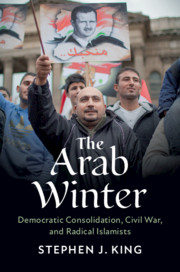Introduction
The Arab Winter: Democratic Consolidation, Civil War, and Radical Islamists
Published online by Cambridge University Press: 14 February 2020
Summary
This chapter introduces the democratic consolidation framework utilized in the book to explain divergent outcomes of the Arab Spring. It argues for the desirability of socioeconomic pacts and analyzing the history and contours of nation and state formation in analysis of democracy.
- Type
- Chapter
- Information
- The Arab WinterDemocratic Consolidation, Civil War, and Radical Islamists, pp. 1 - 29Publisher: Cambridge University PressPrint publication year: 2020
References
- 1
- Cited by



